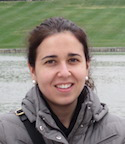Recognizing featured Plant Cell first authors, September 2016
Recently, we’ve been profiling first authors of Plant Cell papers that are selected for In Brief summaries. Here are the first-author profiles from the September issue of The Plant Cell.
Inmaculada Couso, featured first author of Synergism between inositol polyphosphates and TOR kinase signaling in nutrient sensing, growth control and lipid metabolism in Chlamydomonas
Current Position: Postdoctoral Researcher in Plant Biochemistry and Photosynthesis Institute in Sevilla, Spain.
Education: PhD: Department of Chemistry, Biochemistry Div. University of Huelva. M.S. in Chemistry and B.S. in Biology at University of Sevilla.
Non-scientific Interests: Travelling, yoga, and cooking.
I was trained as an analytical chemist and worked on carotenoids in microalgae as a Ph.D. student at the University of Huelva in Spain. My graduate work on microalgae convinced me of their potential for biotechnological applications. Then I received the opportunity to work in Dr. Jim Umen’s laboratory at the Donald Danforth Plant Science Center, where I learned many aspects of the biology and genetics of the model green alga Chlamydomonas reinhardtii. My project started with very basic science questions about growth control in Chlamydomonas mediated by two conserved signaling systems, TOR (target of rapamycin) and inositol polyphosphates, but led to a potentially important discovery about carbon partitioning with practical implications. The vip1-1 mutant that I characterized shows partial uncoupling of storage lipid accumulation from the stress and starvation cues that are normally needed to induce production of storage lipids. During this project we were faced with multiple challenges including development of a sensitive and quantitative assay for cellular inositol polyphosphates without the use of in vivo labeling. Fortunately, good supervision, an ideal set of colleagues at Danforth Plant Science Center, and teamwork enabled our success. Today, I continue to work on green algal cell biology and metabolism and I am even more convinced of their value for biotechnology and for answering basic biological questions.
Keith Lowe, featured first author of Morphogenic Regulators Baby boom and Wuschel Improve Monocot Transformation
Current Position: R Research Scientist, Crop Genome Engineering. DuPont Pioneer, Johnston, IA. 
Education: M.S (1981) in Biology and B.S (1979) in Botany at University of Michigan.
Non-scientific Interests: Antique radio restoration, antique car restoration and restoration of vintage automobile and vacuum tube test equipment.
I was introduced to plant tissue culture as a University of Michigan freshman in 1975 and a few years later learned about protoplast fusion while visiting the lab of Dr. Peter Carlson at Michigan State University. These experiences galvanized my interest in the nascent field of plant biotechnology in which I began my career in 1982 at Stauffer Chemical Company working on maize tissue culture, protoplast isolation and regeneration, continuing in the area of plant transformation at Advanced Genetic Sciences (AGS) and EniChem Americas and eventually joining Pioneer Hi-Bred Intl. in Johnston, IA where I have been working on maize transformation since 1991. By 1995, our lab was focused on the identification of maize transgenes that impart a growth advantage, first concentrating on cell cycle genes to stimulate division rates but rapidly shifting to morphogenic genes that would stimulate embryogenesis. The results presented here are what we hope will be a series of papers on the development of a universal, efficient and rapid cereal transformation system.
Krishna Reddy Challa, featured first author of Activation of YUCCA5 by the Transcription Factor TCP4 Integrates Developmental and Environmental Signals to Promote Hypocotyl Elongation in Arabidopsis
Current Position: Research Associate, Department of Microbiology and Cell Biology, Indian Institute of Science, Bangalore, India.
Education: PhD in Plant Developmental Biology, Indian Institute of Science, Bangalore, India.
Non-scientific Interests: Playing chess, swimming, gardening, angling, watching cricket and movies.
I joined the laboratory of Dr. Utpal Nath at Indian Institute of Science, Bangalore, India in August, 2009 as a PhD student after obtaining my Master’s degree in Microbiology (Osmania University, India). As I was born to and grew up in a family with agricultural background, I was always fascinated by plants, their growth and diversity, and their ability to adapt to the various environmental conditions. Gardening, roaming in the agricultural fields and keenly observing plant behavior used to be my favorite pastime in my childhood. Therefore, when I secured a PhD position in Indian Institute of Science, I was delighted to join a plant development laboratory and to work on the model plant Arabidopsis. I thoroughly enjoyed my stay in this laboratory exploring the molecular basis of developmental signals that converge with the environmental signals in promoting cell expansion in hypocotyls of Arabidopsis. I plan to continue working in this or in a related area during my postdoctoral research.
Zhubing Hu, featured first author of Mitochondrial Defects Confer Tolerance against Cellulose Deficiency
Current Position: Postdoctoral fellow, VIB Department of Plant Systems Biology, Ghent University.
Education: PhD: Plant biology, Institute of Botany, Chinese Academy of Science, Beijing.
Non-scientific Interests: Badminton, hiking, PC games.
After graduating with a B.S, I pursued my master’s degree in Prof. Dr. Zhenguo Shen’s lab at Nanjing Agricultural University to investigate the mechanisms by which plants cope with heavy metal stress, aiming to develop heavy metal hyper-accumulating plants for phytoremediation. Thanks to excellent scientific training and activated curiosity in Shen’s lab, I was lucky to join Prof. Dr. Yuxin Hu (Institute of Botany, Chinese Academy of Science) to accept my second scientific PhD training. During this PhD stage, my project was to identify novel components controlling plant organ size through a genetic screen. Four-and-a-half-years of patient guidance from Prof. Hu have raised me up as a well-trained researcher. From 2010 to 2012, my ability to develop simple and efficient methods to conduct experiments was dramatically improved in the lab of Prof. Dr. Jing Li (Northwest A&F University, China). At the end of 2012, I joined the cell cycle group led by Prof. De Veylder (Gent University – VIB) to explore the signaling networks controlling cell division in response to environmental stresses. Through a phenotype-based compound screening approach, a novel compound (C17) interfering with cell division was isolated. Benefiting from my previous trainings in the three laboratories mentioned above, I rapidly obtained tens of mutants mutated at cellulose synthase and mitochondrial editing genes that exhibited C17 tolerance. The common property of these mutants demonstrated that plants with defective mitochondria perform better against cellulose deficiency, indicating a link between the cell wall and mitochondria, something hardly studied before. The recurring question “What is the benefit for plants holding this signaling mechanism?” from Prof. De Veylder prompted me to put this concept into the context of stresses, demonstrating a novel mechanism for plant adaptation. I am deeply grateful to Prof. De Veylder, who offered me the opportunity to work in this fantastic lab and broaden my horizons in plant research. At the end of September 2016, I will start my own laboratory at College of Life Science, Nanjing Agricultural University. My laboratory will focus on signaling networks maintaining the integrity of the plant genome and cell wall under stresses.
Matthew J. Salie, featured first author of A Family of Negative Regulators Targets the Committed Step of De novo Fatty Acid Biosynthesis
Current Position: Research Associate, Department of Integrative Structural and Computational Biology, The Scripps Research Institute, San Diego, CA.
Education: PhD Biochemistry (2016) University of Missouri-Columbia; BS Biochemistry (2011) Calvin College.
Non-scientific Interests: Golf, guitar and singing, fishing.
I first realized my affinity for metabolism as an undergrad at Calvin College. As a Biochemistry major, I found myself most interested in the class sections that covered metabolism. Understanding how our bodies respond to food or fasting was fascinating to me. This fascination increased when I was given the chance to do research under an amazing mentor, Larry Louters, and studied the antidiabetic qualities of various chemicals. Upon entering Mizzou for my PhD, I wasn’t sure what I wanted to do, but I knew I wanted to study metabolism. So I was glad when I was given the opportunity to study acetyl-CoA carboxylase regulation in Jay Thelen’s lab. At the start, it was unclear what would come out of the project; one doesn’t expect to find a new regulatory mechanism for such a well-studied enzyme in a classic metabolic pathway as was observed in this study. Perhaps this example emphasizes the importance of basic biochemistry research. The fact that this work could lead to increased oil yield in crops and have an impact on people’s lives is an inspiring and humbling thought. I plan to continue to study metabolic pathways and regulation with the hope of solving world problems such as climate change and diabetes.




Leave a Reply
Want to join the discussion?Feel free to contribute!